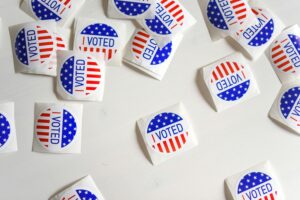
The 2024 presidential election is coming up soon, and election rhetoric is already impacting classroom interactions and atmospheres. When topics related to the election come up in class, our first inclination might be to ignore it, and/or not address any of the emotions surrounding it. However, according to Nancy Thomas, Senior Adviser on Democracy Initiatives at the American Association of Colleges and Universities and Executive Director of the Institute for Democracy and Higher Education, students may resent professors who ignore significant happenings on campus, in the country, or globally, and expect it to be at least acknowledged. So how can educators acknowledge events related to the election while also maintaining effective learning environments for their students? The Center for Teaching and Learning has compiled the following list of tips and resources for educators to refer to and prepare for the upcoming election.
Before/During Class
- Design Your Challenging Conversations Class Session. Utilize classroom activities that support your goals for the discussion and leave space for students to reflect. Prepare questions that are specific, unbiased, and likely to promote discussion.
- Practice pausing when challenging moments arise. Ask students to take some time to first reflect on and then describe what is happening in the conversation, why, and how the class could move in a productive direction.
- Remind students of the discussion expectations that you/they have agreed to.
- End or redirect the conversation using direct and clear messaging (e.g., “Let’s move on from this topic,” or “Let’s return to this conversation if we have time later today, but for now let’s come back to the course materials.”)
- Communicate and practice care: Be cognisant of your own well-being and try to acknowledge and process your own thoughts, emotions, and physical sensations. Encourage students to check in on themselves and with each other if they feel comfortable. You may also offer support by asking “How can I help you learn during these difficult times?” (Imad, 2022)
- Encourage Informed Decisions: Encourage students to educate themselves about election topics in a well-rounded manner.
After Class
- Decide whether to follow up with any individual student either in person after class or in a short email where you share what you observed and note your availability to talk.
- Consider asking for feedback. The Critical Incident Questionnaire is a feedback strategy that is an appropriate tool to debrief challenging conversations.
- Try to process your emotions with colleagues or other people you trust if you feel activated or triggered by the discussion.
- Grow your teaching skills around course design, class session design, and facilitation.
If you are concerned about disruptive student behavior you may also reach out to the Dean of Students Office for help and resources.
On a positive note, while the day after the election may be a day of heightened emotions and conflict, it can also be a catalyst for meaningful conversations and, thus, learning. One of Boise State’s Shared Values is that “higher education has the duty to educate students to be responsible citizens. Boise State strives to provide a culture of civility and success […]”. The election thus provides us a timely opportunity to live this value.
If you are interested in discussing these or other pedagogical strategies to prepare for turbulent teaching times, reach out to the Center for Teaching and Learning (ctl@boisestate.edu) or submit a consultation request form.
Further Resources
- Selecting classroom activities for discussing policy, politics, and social issues
- AAC&U’s Institute for Democracy & Higher Education: Speech, Inclusion, and Academic Freedom
- How Faculty Can Prepare to Handle the Post-Election Classroom
- Educating for Deliberative Democracy
- Readiness for Discussing Democracy in Supercharged Political Times
Sources
“Difficult Discussions.” Center for New Designs in Learning and Scholarship at Georgetown University.
“How to Rebuild a Broken Connection With Students.” The Chronicle of Higher Education, 2024.
“Preparing to Teach During the 2024 Election.” Center for Research of Learning and Teaching at the University of Michigan.
“Strategies to Support Challenging Conversations in the Classroom.” Center for Educational Innovation, University of Minnesota, 2024.
“Teaching Around the Election: Flexibility, Acknowledgement, and Other Strategies.” Center for New Designs in Learning and Scholarship at Georgetown University, 2020.
“Teaching During Turbulent Times.” Searle Center for Advancing Learning and Teaching Guide. Northwestern University, 2023.
“Teaching: ‘Students resent professors who ignore public events.” Chronicle Teaching Newsletter, 2024.